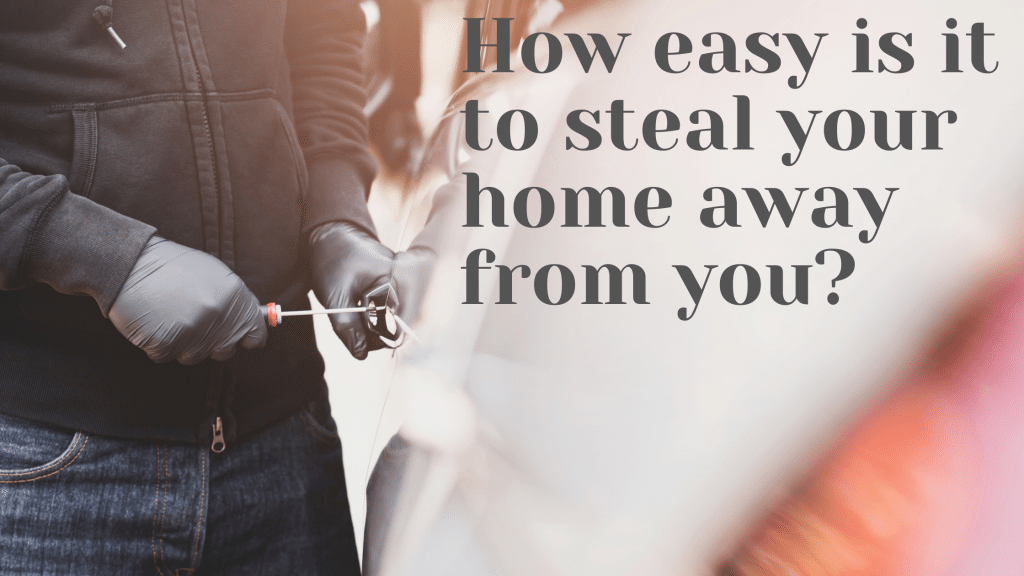
Apparently not that difficult with a little know-how, and boldness.
When your conveyancer asks you to ‘identify’ yourself it is with good reason.
We have all heard of identity theft and probably laughed it off as “it will never happen to me”.
But do you know where your personal information is stored?

Much of your personal information now resides on dozens, if not hundreds of servers across the globe, many now in ‘cloud storage’, e.g. MyGov, driver’s license, passport, bank accounts, your work uses the cloud to store information, etc. Even your mobile phone apps are storing information about you in various places around the globe.
How protective are you of your identity?
Ask yourself, did you totally destroy that electricity or water bill, or did you just throw it in the bin (name, address, with account details)? After you paid your phone bill did you destroy the invoice (name, address, with account details)? When did you last change your password on your computer / email / Facebook / twitter etc.? For many of us the answer is “Not recently!”
In 2018, 1 in 3 Australian Adults Fell Victim to Cybercrime
Six million Australians were the victim of Cybercrime in 2018, constituting a 13 per cent increase from 2017 with a total of $2.3 Billion Dollars lost to thieves. This upward trend in cybercrime is the result of an ever increasingly connected world, a world in which cybersecurity has not been able to keep pace.
So how safe is your identity today? A question we all need to consider.
Historically identity theft has been viewed to be someone accessing your bank accounts, using your credit card or taking out loans in your name – all without your permission.
In the age of technology, it extends further and we’ve seen a rise in people impersonating others on social media and online forums, with an intention to cause harm and often leading to emotional scars or even worse consequences
How then does this affect your home?
Fraudsters assume false identities so that they can pass themselves off as landowners. This enables them to offer the land as security for a loan or to sell it to a third party, and then pocket the cash and disappear.
Verifying the identity of the person claiming to be the owner of a property and therefore has the authority to sell that property, is a crucial step in any property transaction process.
Your conveyancer must comply with stringent rules which requires them to legally and formally verify your identity. It is a legal requirement in order for a property transaction to settle, even if you and your conveyancer are familiar with each other.
A Bite Of Reality
There are some easy safety measures you can take to better protect yourself, although these also come with ultimate restrictions/sacrifices:
- Use the highest privacy settings on social media, limit personal information shared and don’t accept ‘friend’ requests from people you don’t know;
How many of you have limited your Facebook (any social media) friendships? Or have you just be-friended anybody and everybody.
- Avoid using public computers or wireless hot spots for personal affairs;
When you walk into a supermarket have you set your phone to automatically connect with the free wifi.
- Ensure your computer’s security and virus software are up to date;
When was the last time you updated your computers, even your phones, security and virus software?
- Don’t provide your personal details in person, over the phone, internet or by email without first verifying the identity of the person and organisation requesting it and asking for their privacy policy (particularly if the call or email is unexpected – like informing you of a lotto win or that you are a beneficiary in a will);
How easy is it to just answer questions over the phone to a person you do not know. I’m sure we’ve all done it at some time.
- Don’t save passwords in your phone or in writing at home, and use strong passwords unlike your children’s names, dates of birth or addresses;
If I didn’t write down my passwords with all those silly non meaningful characters of which I have several, I would never remember them.
- Destroy any personal documents you no longer require and secure those you need.
Destroy personal documents means burn them – shredding just requires time and sticky tape to put them back together.


